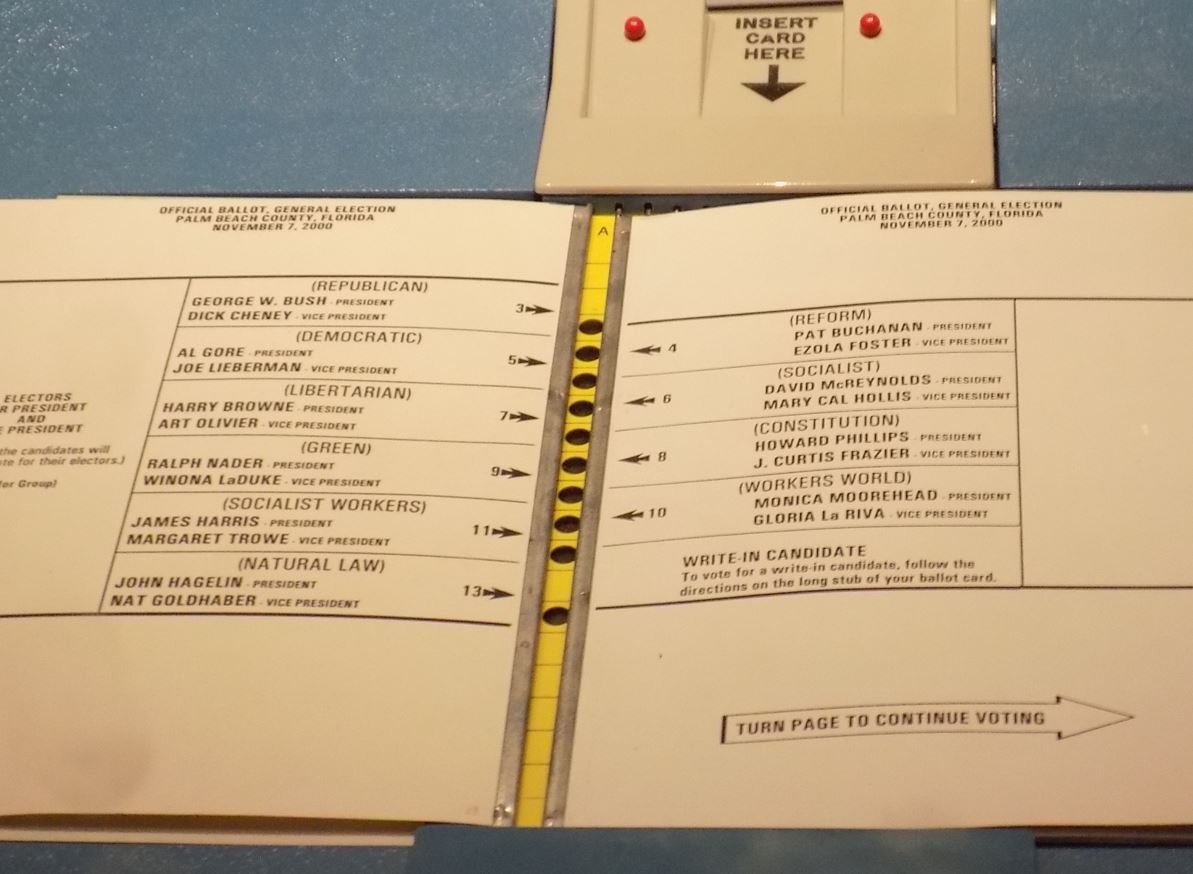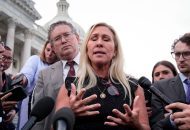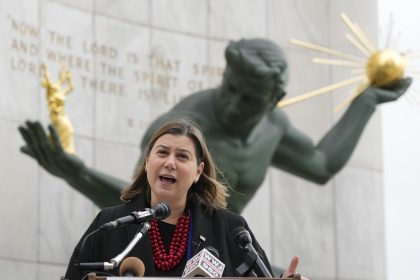What If Someone Cries ‘Rigged Election’ During the Primaries?

WASHINGTON — It’s admittedly a hypothetical question, but given the divisive rhetoric that has swirled around elections and politics in general since November 2020, it seemed worthwhile to put it to elections officials across the country anyway:
Just what would happen if a candidate cried “rigged election” during the primaries?
And that, naturally, led to a series of follow-up questions:
Does your election office have any contingencies in place to respond rapidly to such assertions?
And what would be the ramifications if a candidate filed a legal challenge to the primary results?
Could it slow or prevent certification of the results and, possibly, throw the delegate count into doubt ahead of the nominating convention?
And, finally, does the state have any special security plans in place in case there are threats of, or actual outbreaks of violence after such accusations are made?
Over the past month, The Well News has put these questions to secretaries of state and election officials across the country.
In some cases, the responses were less than we hoped for; for instance, the Louisiana secretary of state’s office simply said, “We will not be offering comment.”
In other instances we learned something we were not aware of; a case in point being from officials in Utah, who told us the Republican Party has opted out of a state-run primary and is instead running “a preference poll” as part of its neighborhood caucus meetings.
A similar scenario will play out in the District of Columbia this year, where the Republican Party has opted not to hold a primary election, but will instead conduct its own presidential nominee selection event in March.
Yet over time, our hypotheticals did gain some traction.
“Unfortunately, our office has been responding to false claims of ‘rigged elections’ for years now, and there has certainly been an increase in such claims since then-candidate Trump started spreading the false and highly damaging narrative [in 2016] that elections are routinely ‘rigged,’” said Lauren Hibbert, Vermont’s deputy secretary of state.
If someone were to make such a claim this primary season, Hibbert said the secretary of state’s office would first ask the candidate whether they actually have any facts or evidence to back up their claims.
“We would investigate any such alleged facts, and then respond to the candidates with information countering any such assertions,” Hibbert said. “In the face of continued allegations, we would inform the candidate of their ability to contest the election in court and inform them of the steps required.
“If the candidate were to go public with their assertions, we would generally direct the public to our website and social media accounts as the source of trusted information regarding election administration and the fact that our elections are secure, and the results are reliable,” she added.
Hibbert said the work of combating misinformation and disinformation about elections isn’t something that just occurs around Election Day, or every four years in the case of a presidential election, but is actually a part of every single day of the year for her office.
“And we do this work in a lot of different ways,” she said. “[It could be] through individual conversations with Vermont voters, messaging on our website and social media accounts, and responding to allegations of fraud at all levels and all points in the process.”
As for why her office puts such an emphasis on battling misinformation, Hibbert said, “We see this trend as a threat to Americans’ confidence in the election process and ultimately our democracy.
“Unfortunately, it has become a big part of the job for election administrators and will likely continue to be going forward,” she added.
Sadly, that assertion was effectively seconded by Cassondra Knudson, press secretary for Minnesota Secretary of State Steve Simon.
“For the past several years, we have heard numerous false claims about our election system — how it works, who does the work and why they do the work,” she said.
In response, the office has established a dedicated website, Minnesota Secretary Of State – Minnesota Elections Facts, to serve as a designated space to clarify misinformation.
“We also have partnerships with local elections offices, voter outreach organizations, social media platforms and media outlets to get correct information out proactively and responsively,” Knudson said.
Another way states are bolstering faith in the elections they preside over is muscling up their election processes.
A good example of that is the state of Pennsylvania where former attorney general and now Gov. Josh Shapiro has made “safe, secure and fair elections” a priority.
Having committed to protecting all Pennsylvanians’ right to vote, the Shapiro administration has worked to improve the efficiency and transparency of its elections, and ensure that every legal ballot is counted.
As of the 2020 election, all 67 Pennsylvania counties have state-of-the-art, secure voting systems that provide a vote-verifiable paper record.
“In addition, counties perform two audits after every election: a risk-limiting audit and a statutorily required 2% statistical sample,” said Amy Gulli, spokeswoman for the Pennsylvania Department of State.
At the same time, she said, the department continuously monitors traditional media and social media for misinformation and disinformation.
“We also have a voter information campaign that uses social media posts and videos, press releases, text messages, emails and media interviews to provide all eligible voters with accurate, trusted election information,” Gulli added.
Rachel Soulek, director of the South Dakota Division of Elections, also expressed confidence in the state’s election processes, which, she said, “will look towards the paper ballots used, the checks and balances in place and a post-election audit to combat any doubt.”
Closer to home, in fact, right here in D.C., Sarah Winn Graham, director of Communications for the city’s Board of Elections, said the department “has specific procedures in place to ensure the integrity of D.C.’s elections.
“These include the testing of voting machines, the provision for poll watchers and observers to monitor the casting and counting of ballots, and the post-election audit of the results.
“Many of these safeguards are open to the public,” Graham said. “In addition, we plan internally for rapid response communications, which includes protocols for sharing public information on social media, on our website, through traditional media, and other public communications networks.
“With these plans and procedures in place, we are confident that DCBOE could rapidly respond to and dispel any claims of a rigged election,” she said.
Contested Primaries
So what if a candidate did file a legal challenge to a primary result?
In Vermont, Hibbert said, a contested election is governed by 17 VSA 2603.
“It requires that a complaint must be filed in Superior Court within 15 days of the election,” she said, adding that “this could, in theory, delay the certification of results from the presidential primary.”
“Our presidential primary takes place on the first Tuesday in March, however, and our office would anticipate any challenge being resolved by the courts well in advance of the national nominating conventions in August,” Hibbert said. “Subsection (d) of the statute cited above calls for any such cases regarding the contest of elections to be placed on a priority docket:
(d) The Vermont Rules of Civil Procedure shall apply to contests of elections, except that such cases shall be placed upon a special calendar, and hearings shall be scheduled on a priority basis, as public policy demands that such questions be resolved promptly.”
Minnesota, Knudson said, allows for publicly and privately funded recounts depending on the margins of the results.
“We would hope and expect that Minnesota courts would act expeditiously when critical election matters are before them to ensure legal proceedings don’t undermine public confidence in the election results,” she said.
A number of states, including South Dakota, have laws in place to give top priority to any election-related litigation.
In the District of Columbia, election laws and a history of court decisions impose tight mandatory timeframes and a heightened standard for challenging election results.
Under D.C. Official Code §1-1001.11(a)(1), a candidate has seven days to request a recount of the certified votes in one or more voting precincts.
Similarly, under D.C. Official Code §1-1001.11(b)(1), a voter has seven days to file a petition for review of the results of the election in the D.C. Court of Appeals.
In addition, election results must be certified before either of the provisions mentioned above can take place.
“As a result, it is highly improbable (if not impossible) for a legal challenge to have any consequential impact on the timing or validity of certification, but it is left to the discretion of the court to take any action regarding election results,” Graham said.
Close, Contested and Far From Hypothetical
Derrick Nunnally, spokesman for the Washington state secretary of state’s office, said generally speaking, the office has contingency protocols it would follow in the event of a challenge to the state’s elections process, “whether from a logistical standpoint or due to other issues.”
“As you can see from our “Vote with Confidence” campaign, Secretary [Steve] Hobbs has been proactive for more than a year in showing why Washington’s elections are secure and trustworthy. Those efforts are ongoing, as is the office’s full commitment to administering elections with transparency and integrity,” Nunnally said.
That said, Nunnally pointed out that Washington is no stranger to legal challenges that extend the amount of time before an election winner is known.
In fact, there is a book about one of them; an account of the November 2004 governor’s race called “An Election for the Ages,” available from the secretary of state’s office.
The candidates in the race were Democratic Attorney General Christine Gregoire, former Republican state Sen. Dino Rossi and Libertarian Ruth Bennett.
When all 39 Washington counties completed their initial vote counts on Nov. 17, 2004, about two weeks after election day, Rossi had a lead of 261 votes.
In all, 1,371,414 voters had cast their ballot for the Republican, while 1,371,153 had supported Gregoire, and 63,346 had voted for Bennett.
Because the leading candidates were separated by fewer than 2,000 votes, state law mandated a machine recount. In that count, Rossi gained 1,070 votes but Gregoire gained 1,289 votes, whittling Rossi’s lead to only 42 votes.
Although then-Secretary of State Sam Reed, a Republican, certified that result just after Thanksgiving, state law allows any candidate or party to request an additional recount, for which the requester must pay, with the payment refunded if the recount changes the outcome.
The Democrats requested and paid for a manual (hand) recount, which was completed on Dec. 23, 2004.
It showed that Gregoire had won by 129 votes, as she picked up another 919 votes, while Rossi’s total increased by only 748 votes.
The final results were: Gregoire 1,373,361 votes (48.8730%); Rossi 1,373,232 votes (48.8685%); and Bennett 63,465 votes (2.2585%).
Reed granted Gregoire a certificate of election, the state Legislature approved the election results, and Gregoire was sworn in as governor on Jan. 12, 2005.
But the election dispute wasn’t over.
Republican leaders in the state asserted that hundreds of convicted felons had voted illegally in the election (Washington law requires felons to have their civil rights restored before they can vote) and charged that several other irregularities had occurred, particularly in the Democratic stronghold of King County, Washington.
Though they filed their lawsuit before Gregoire took office, the matter wasn’t settled until after a two-week trial was held the following spring.
On June 6, 2005, Superior Court Judge John Bridges rejected the Republican claims, holding that while significant errors had occurred in King County, they were not the result of fraud or intentional manipulation.
That left the matter of the alleged illegal felon votes — some 1,678 of them.
The problem for Bridges was that with the exception of five votes, no evidence was presented showing for which gubernatorial candidate the other votes were cast.
Since the Democrats introduced declarations by four felons stating they voted for Rossi (and one who voted for Bennett), Bridges deducted those votes from the official totals, leaving Gregoire with a final margin of 133 votes — the closest in any gubernatorial election in United States history.
Safeguarding the Upcoming Primaries
For many, images of the Jan. 6, 2021, siege on the U.S. Capitol by insurrectionist supporters for former President Trump, and the level of vitriol now commonplace in politics generally, has stoked fears of harassment and violence at polls after the voting begins in January.
And in many states, election officials are already putting heightened security plans in place in the event of threats or actual outbreaks of violence, particularly if the specter of a “rigged” election is raised.
In Vermont, Hibbert said elections officials are in regular contact with their law enforcement partners at all levels, local, state and national, to prepare for a coordinated response to any such incidents.
“We communicate with these partners regularly and in advance of each statewide election, we meet as a group to discuss response plans,” she said.
“This level of coordination between law enforcement at all levels has been steadily growing since the 2016 elections and is focused on coordinated incident response to both potential cyberattacks and physical violence as well,” she continued. “Thankfully, Vermont has not experienced any such incidents to date, but we are still taking all the necessary steps we can to prepare in the interest of being ready for anything that may happen.”
In Pennsylvania, Amy Gulli said, the Department of State routinely works with local, state and federal law enforcement and national security agencies, including the Pennsylvania State Police, the FBI and the U.S. Department of Homeland Security, “to monitor, identify and mitigate emerging threats and to report any threats we become aware of to the appropriate law enforcement agencies.
“Gov. Shapiro has made clear that his administration will stand firm against any efforts to undermine Pennsylvanians’ voting rights while working to protect the integrity of our elections and strengthen our democracy,” she said.
Meanwhile, in Minnesota, the secretary of state’s office has recently expanded the scope of work for its cybersecurity team to include physical security.
“This allows us to coordinate with local, state and federal law enforcement partners to make physical election security recommendations to local election offices,” Knudson said.
In the District of Columbia, the Board of Elections maintains security relationships with both Homeland Security and the D.C. Metropolitan Police Department to ensure the physical safety of voters and staff on Election Day, along with the safe delivery and protection of paper ballots and electronic voting results.
“On Election Day, both paper ballots and electronic voting results are delivered to their respective counting locations by Metropolitan Police Department escort,” said Graham. “Any post-election outbreaks of violence would be a matter for law enforcement.”
“The integrity, security, safety and accessibility of elections is a top priority for state and local election officials across the country,” said Maria Benson, spokeswoman for the National Association of Secretaries of State.
“Americans should have confidence that our elections are fairly administered and well-secured, with built-in structural safeguards to ensure accurate results,” she said. “Chief election officials have numerous ways to engage with their voters such as public election awareness campaigns, connecting with their media outlets, utilizing their social media channels, etc.
“For a national example, many NASS members engage in our #TrustedInfo effort, which highlights to the public that election officials are the trusted sources of election information,” Benson continued. “Beyond this, NASS defers to the states on specific preparations they are making and for insight on their respective state laws.
“Lastly I would just like to add a plug — a great way to become part of the election process and serve your community is to become a poll worker. You can see election administration first hand and often get paid for your time,” she said.
Because it will serve as the stage for the biggest election interference trial stemming from the 2020 presidential election, we left the responses from Georgia for last.
In August, former President Trump was indicted over what prosecutors in Atlanta described as his efforts to unlawfully undo his election loss in Georgia in 2020.
The indictment includes 13 criminal charges against Trump, as well as charges against 18 of his allies. Trump has pleaded not guilty in the case.
Two of the attorneys who allegedly tried to assist him in the effort to overturn the 2020 election results, Kenneth Chesebro and Sidney Powell, are facing trial this month.
“Our office has withstood and fought back against election deniers in all their many forms — whether it was Stacey Abrams denying the results of the 2018 election, or former President Donald Trump falsely claiming he ‘won’ Georgia,” said Mike Hassinger, public information officer for election in the Georgia secretary of state’s office.
“We didn’t hear any denialism about the elections in 2022, mostly due to [Georgia Secretary of State Brad Raffensperger’s] relentless outreach to Georgia voters about the security and integrity of our elections systems and processes.
“We will continue to inform the public up to and throughout the primaries next March,” Hassinger said.
He went on to say that when it comes to legitimately challenging the results of an election in Georgia, state law requires a Risk Limiting Audit be performed after an election, and that the results be certified no later than 5 p.m. on the 17th day following the election.
“Candidates may request a recount within two days following certification, but such a request — or even a lawsuit contesting the results — would not delay certification, nor the allocation of delegates,” Hassinger said.
On security he added, “elections in Georgia are conducted at the county level, and our office maintains regular dialogue with local law enforcement agencies leading up to and throughout every election. We will continue to do so.”
Dan can be reached at [email protected] and at https://twitter.com/DanMcCue























